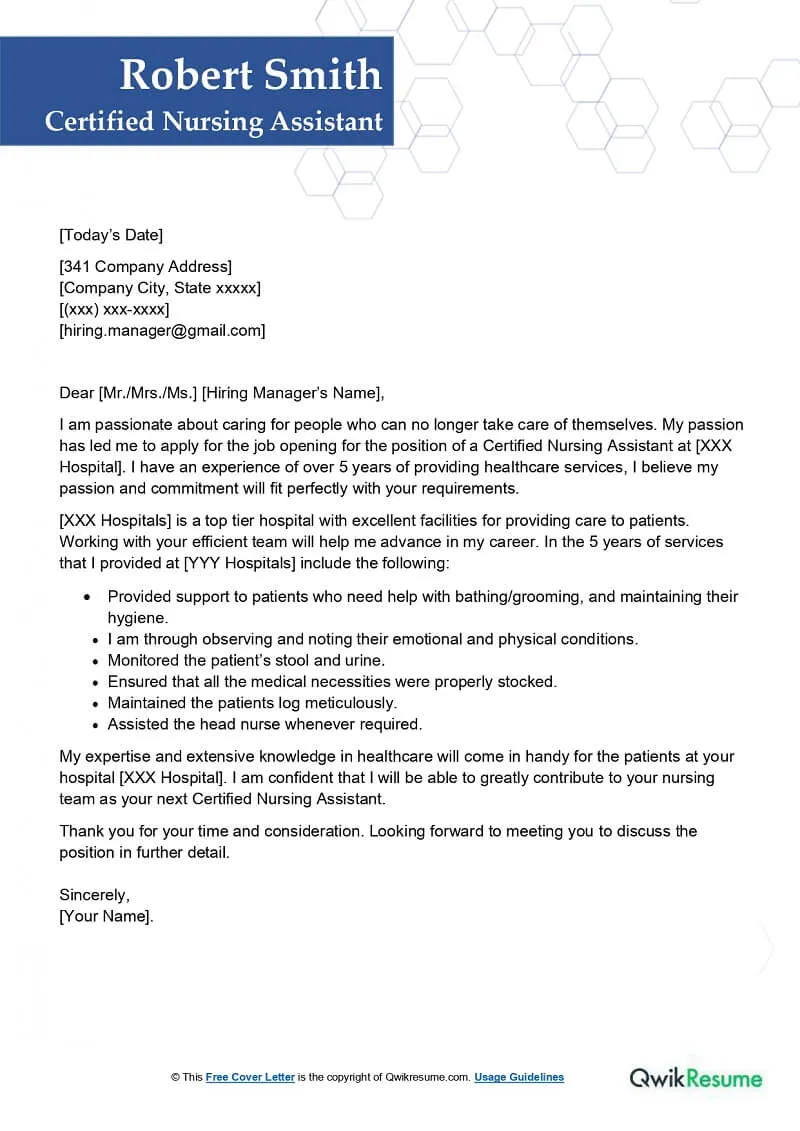What is a Nursing Assistant Cover Letter
A nursing assistant cover letter is a crucial document that accompanies your resume when applying for a nursing assistant position. It serves as your introduction to the hiring manager and provides an opportunity to showcase your skills, experience, and passion for the role. Think of it as your personal sales pitch, designed to convince the employer why you’re the best fit for the job. Unlike a resume, which lists your qualifications, a cover letter allows you to elaborate on those qualifications and connect them directly to the specific requirements of the position. It’s your chance to demonstrate your personality and enthusiasm, making you stand out from other applicants.
Why Is a Cover Letter Important for a Nursing Assistant?
In the competitive field of healthcare, a well-crafted cover letter can significantly increase your chances of landing an interview. It’s important because it provides context to your resume. It explains why you want the job and how your skills align with the employer’s needs. A strong cover letter demonstrates your communication skills, attention to detail, and your understanding of the role. Many hiring managers specifically look for a cover letter, viewing its absence as a sign of a lack of interest or professionalism. A cover letter also offers the chance to address any potential concerns the employer might have, such as gaps in your employment history or a change in career path. This proactive approach can make a positive impression, setting you apart from candidates who only submit a resume.
A cover letter can set you apart from other applicants. (cover-letter-importance.webp)
Key Components of a Nursing Assistant Cover Letter
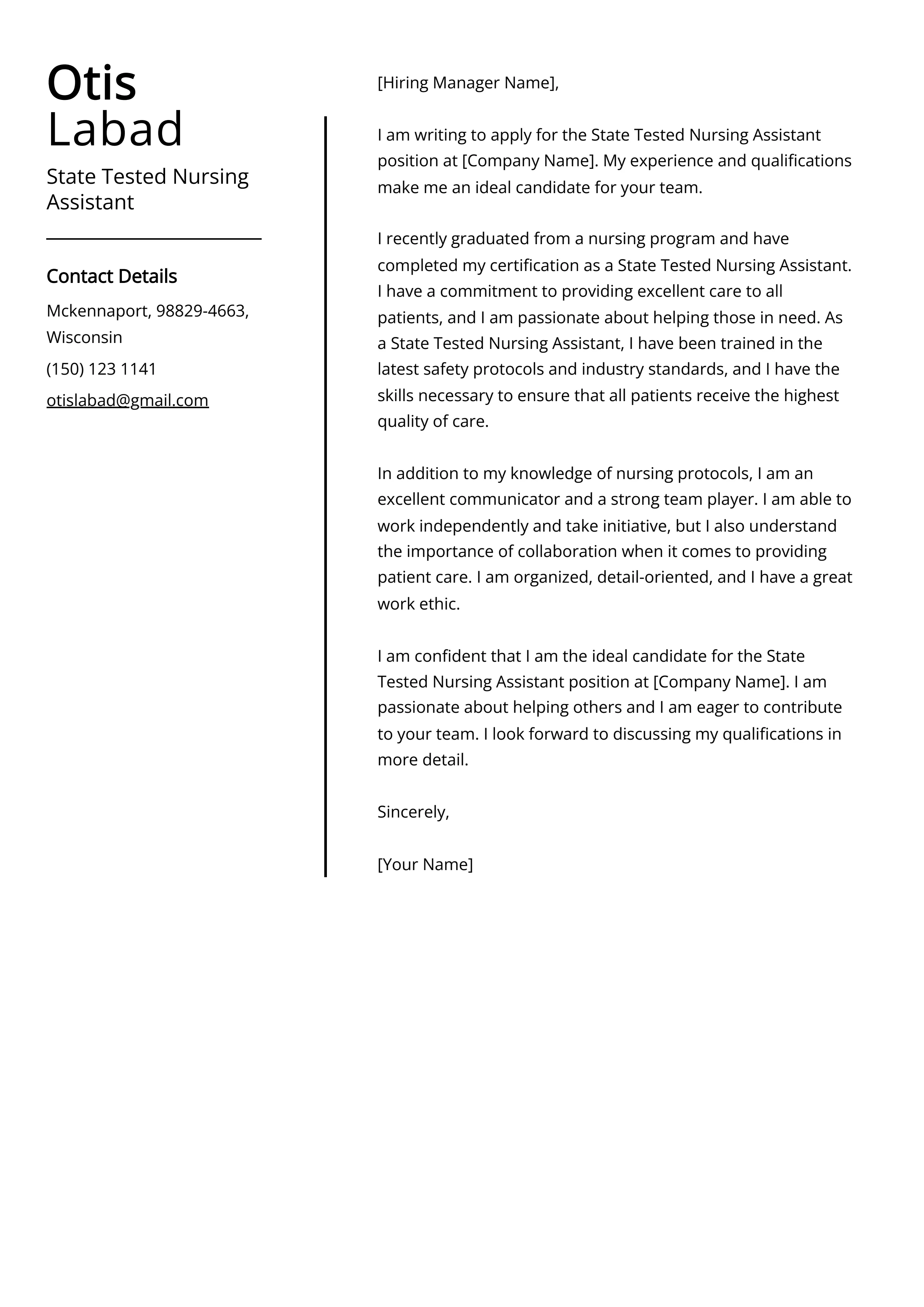
Your Contact Information
Start your cover letter by including your full name, address, phone number, and email address at the top. This information should be easily accessible and clearly visible. Ensure your email address is professional; avoid using nicknames or informal language. Proofread this section carefully to avoid any errors that could prevent the employer from contacting you. This ensures the hiring manager can quickly and easily reach you. Using a clear, easy-to-read font for this information will also help make it accessible. Check all contact information for accuracy.
The Date
Following your contact information, include the date you are sending the cover letter. This is a standard practice in formal business communication. Make sure the date is correct and formatted appropriately. Place the date directly below your contact details, usually aligned to the left or right. This helps to establish when you are submitting the application. The date provides context and shows the letter’s recency. The date should include the month, day, and year. Avoid abbreviations.
Employer Contact Information

Next, include the hiring manager’s name, title, and the name and address of the healthcare facility. If you know the hiring manager’s name, address the letter to them directly; otherwise, use a generic greeting. Research the facility to find the correct contact person. A personalized cover letter demonstrates your interest and attention to detail. Include the facility’s name and address to show you are applying for a specific position. Using the right name shows you took the time to find the correct contact information.
Professional Salutation
Start your cover letter with a professional salutation, such as ‘Dear Mr./Ms. [Last Name]’ if you know the hiring manager’s name. If you don’t know the name, use ‘Dear Hiring Manager’ or ‘Dear [Department Name] Hiring Team.’ Avoid informal greetings like ‘To Whom It May Concern.’ This sets the tone for the rest of your letter. Ensure the salutation aligns with the level of formality expected by the healthcare facility. Getting the salutation correct is critical, as it is the first thing the hiring manager reads. A proper salutation indicates you have taken the time to personalize your application and are paying attention to detail.
Crafting the Body of Your Cover Letter
Highlighting Your Skills and Experience
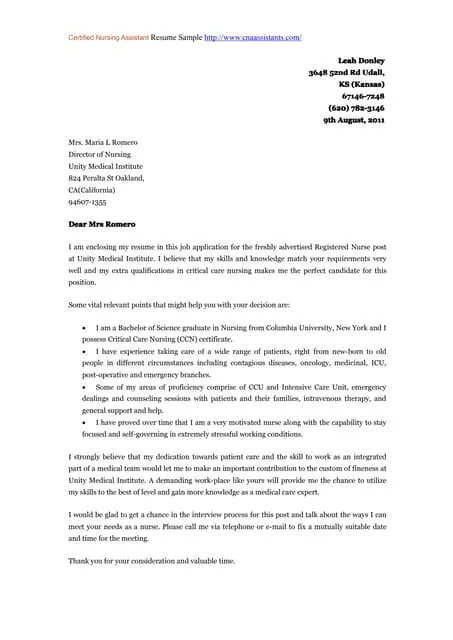
The body of your cover letter is where you showcase your skills and experience. Start by stating the position you are applying for and where you saw the job posting. Then, highlight the skills and experience that make you a strong candidate. Refer to the job description and emphasize the skills and experience that match their needs. Use specific examples from your previous roles to illustrate your abilities. Quantify your achievements whenever possible. For instance, instead of saying “Provided excellent patient care,” say, “Successfully assisted in the care of 20+ patients daily, ensuring their comfort and safety.” Tailor your letter to each job application.
Detail your relevant skills and experience (nursing-assistant-skills.webp)
Emphasizing Relevant Certifications and Training
Nursing assistant roles often require specific certifications, such as Certified Nursing Assistant (CNA) certification, CPR certification, and First Aid certification. Clearly state your certifications and their expiration dates. Include any specialized training or qualifications that are relevant to the position. For example, if you have experience working with specific patient populations (e.g., geriatric care, pediatric care), mention it. This demonstrates your commitment to professional development and your ability to meet the requirements of the job. Be sure to list all licenses and certifications.
Showcasing Your Passion for Patient Care
Express your passion for patient care and your commitment to providing compassionate support. Explain why you are drawn to the nursing assistant role and what motivates you to help others. Share a brief anecdote or personal story that highlights your empathy, patience, and ability to connect with patients. Employers want to hire people who are genuinely caring. Demonstrate your understanding of the importance of patient dignity, respect, and comfort. This can set you apart from other candidates and show the hiring manager that you are more than just qualified – you are truly passionate about making a difference in patients’ lives.
Show your passion for helping others (nursing-assistant-passion.webp)
Demonstrating Your Soft Skills
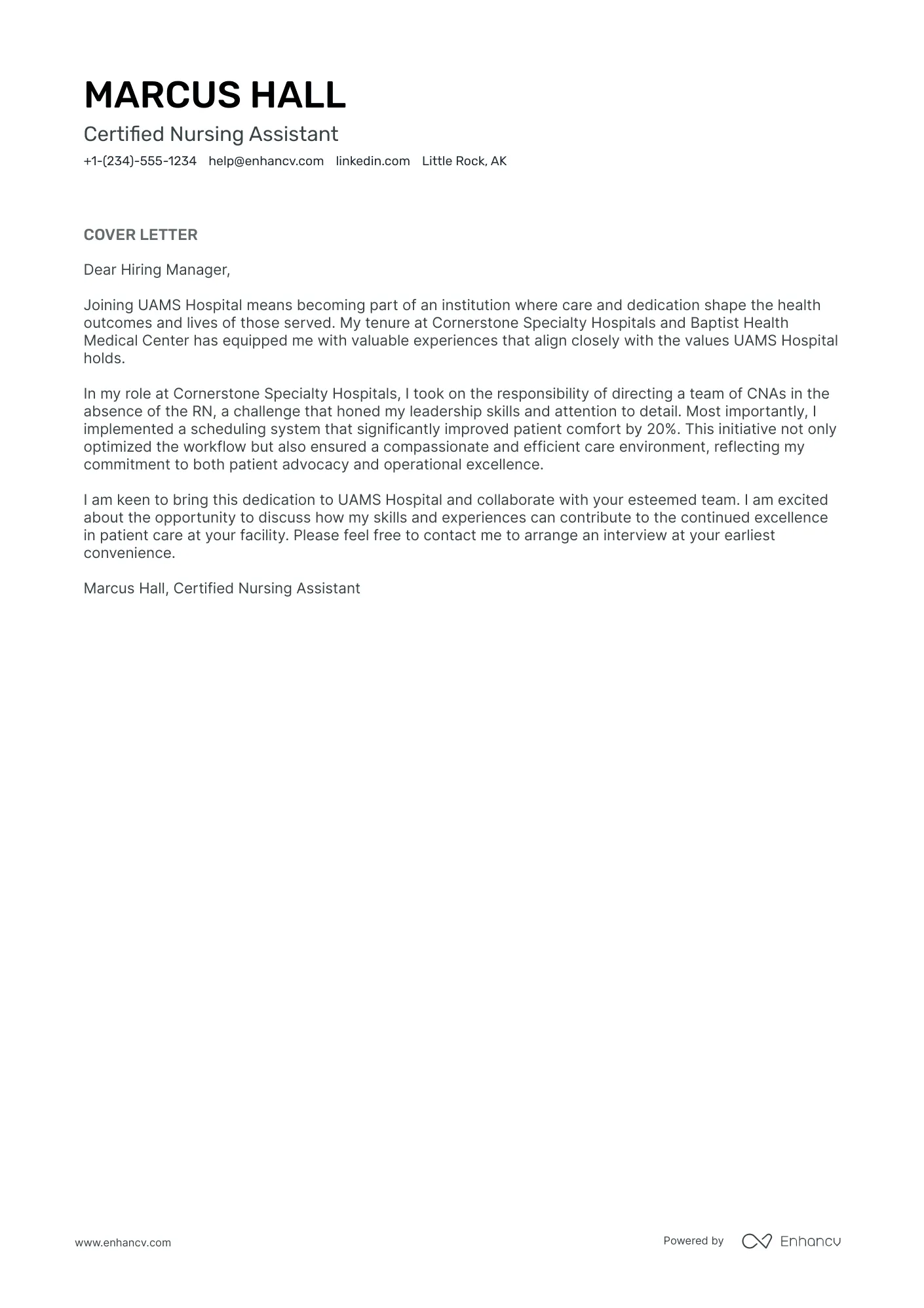
Highlight your soft skills, such as communication, teamwork, problem-solving, and adaptability. Nursing assistants need to interact with patients, families, and other healthcare professionals. Give examples of how you have used these skills in previous roles. For example, describe how you resolved a conflict with a patient, collaborated with a team to improve patient care, or adapted to a change in a patient’s condition. Use action verbs to describe your skills. Some examples include, ‘Communicated effectively with patients’, ‘Collaborated with the nursing team to provide holistic care’, ‘Resolved patient concerns with empathy’.
Closing Your Cover Letter
Formal Closing and Signature
Close your cover letter with a formal closing, such as ‘Sincerely,’ ‘Respectfully,’ or ‘Best regards.’ Leave space for your handwritten signature, followed by your typed name. If you’re sending a digital cover letter, you can type your name below the closing. Thank the hiring manager for their time and consideration. Express your enthusiasm for the opportunity and reiterate your interest in the position. Offer to provide any additional information or references they may need. This shows you are proactive and dedicated to the application process. End with a polite and professional closing. This leaves a lasting positive impression.
Reviewing and Editing Your Cover Letter
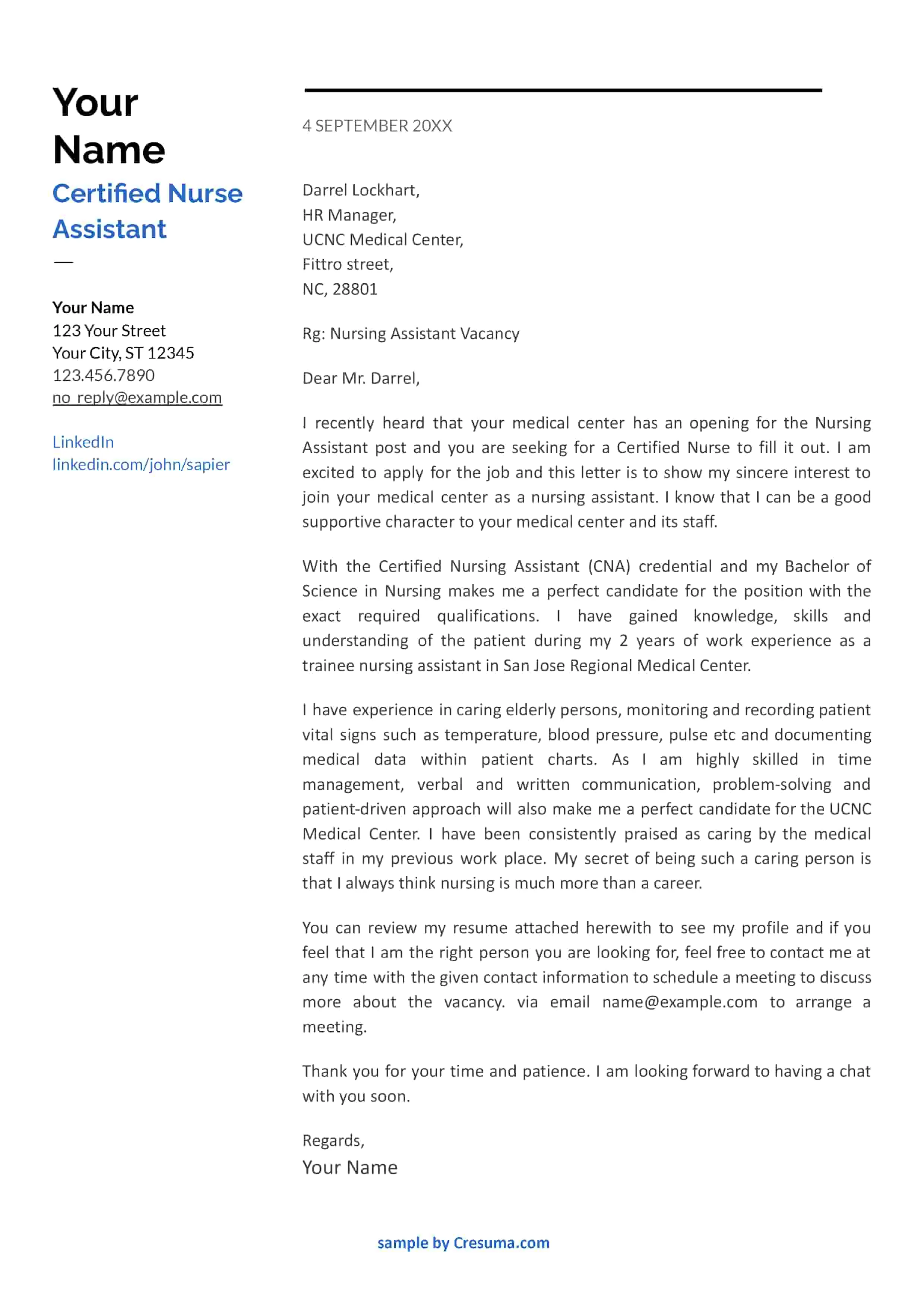
Common Mistakes to Avoid
Avoid common mistakes that can undermine your application. These include typos, grammatical errors, and vague language. Make sure to proofread your cover letter multiple times. Do not use generic cover letters; tailor each letter to the specific job and company. Avoid sounding overly formal or too casual. Ensure your letter is concise and focused, avoiding unnecessary details. Don’t include information that is irrelevant to the job requirements. Never exaggerate or lie about your skills or experience. Proofread to eliminate errors (cover-letter-mistakes.webp)
Formatting Tips
Use a clean, professional font such as Times New Roman, Arial, or Calibri. Ensure your font size is easy to read, typically 11 or 12 points. Use standard margins (1 inch on all sides). Keep your cover letter concise, ideally no more than one page. Use clear and concise language. Break up large blocks of text into paragraphs. Use bullet points to highlight key skills and accomplishments. Proofread your cover letter for formatting errors. Make it easy to read.
Cover Letter Examples for Nursing Assistants
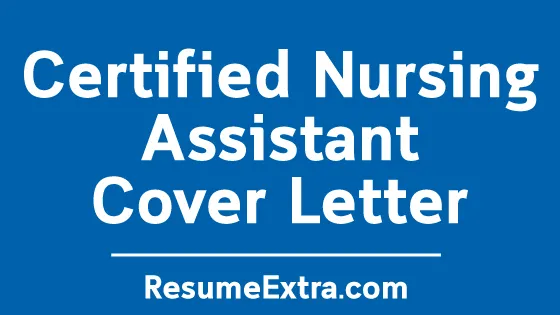
Review cover letter samples for nursing assistants to get an idea of formatting, content, and tone. Many online resources provide templates and examples you can adapt to your own needs. Tailor the examples to your personal qualifications. When using templates, customize them to fit your own experiences and the specific requirements of the job. Look at several examples to understand the various ways you can present your skills and experience. Make sure each cover letter is unique. Use examples as a starting point. (nursing-assistant-example.webp)
By following these guidelines, you can create a compelling nursing assistant cover letter that grabs the attention of hiring managers. Focus on highlighting your skills, experience, and passion for patient care, and you’ll significantly increase your chances of landing an interview. Good luck with your job search!
